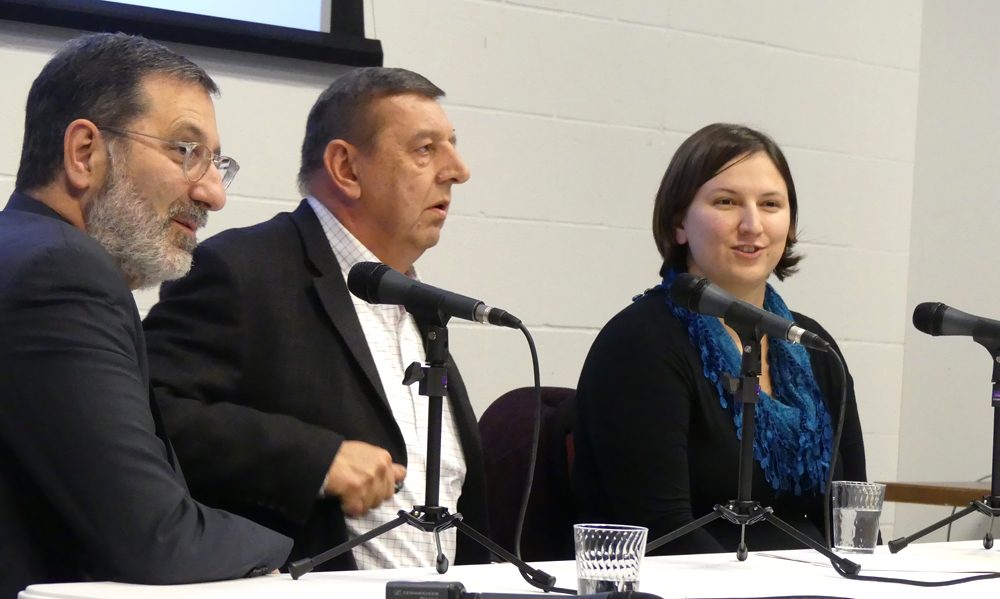 From left: ProPublica Editor-in-Chief Stephen Engelberg, Enterprise Publisher Les Zaitz and Reporter Jayme Fraser answer questions about Oregon’s criminal insanity system. (The Enterprise/Pat Caldwell)
From left: ProPublica Editor-in-Chief Stephen Engelberg, Enterprise Publisher Les Zaitz and Reporter Jayme Fraser answer questions about Oregon’s criminal insanity system. (The Enterprise/Pat Caldwell)
ONTARIO – Local residents and government officials agreed at a community forum last week: Oregon does not adequately help people with serious mental illness, particularly those entangled in the justice system.
About two dozen people gathered at Four Rivers Cultural Center for the Thursday session, “The Consequences of a Sick System,” to hear the results of a months-long investigation by the Malheur Enterprise and ProPublica, a national nonprofit investigative newsroom. The two newsrooms partnered to examine the state’s system for dealing with the criminally insane.
The reporting project, led by Enterprise reporter Jayme Fraser, was triggered by an incident about two years ago.
In January 2017, prosecutors say Anthony Montwheeler killed Annita Harmon of Weiser and David Bates of Vale just weeks after the Oregon Psychiatric Security Review Board released him from its custody. The case raised broader questions about Oregon’s handling of people charged with crimes and judged not guilty by reason of insanity.
Along with Fraser, Enterprise Publisher Les Zaitz and ProPublica Editor-in-Chief Stephen Engelberg answered questions.
Fraser explained her investigative work, how Oregon’s criminal insanity system works, and discussed gaps between what experts know and how state laws are written.
The Enterprise researched the 526 people deemed legally insane in felony cases in Oregon and freed from January 2008 to January 2018. The investigation found that about 35 percent were charged with new crimes.
The key, said Fraser, is the level of supervision and care individuals receive.
“When people have access to what doctors say is the appropriate level of care they do very well,” said Fraser.
Once freed from state custody, records show that many people struggle to find adequate care in the community, which leaves them vulnerable to more criminal conduct. Others sometimes became homeless or died.
Lack of appropriate care is important, especially to emergency service providers who often are called to intervene with people in a mental health crisis. The Enterprise found that first responders were often victims of new violence.
“It comes down to funding and dollars. It is scary the lack of resources we have. It is frustrating,” said Cal Kunz, Ontario police chief.
The crimes against first responders are usually minor – kicking and punching police officers, for instance – but attacks on family tended to be the worst and included broken bones, rape and murder.
Family members of people with serious mental issues said they struggled to get their relatives into community treatment or sent to the state hospital. They are often left waiting for their family member to commit a crime so a court can order them into appropriate treatment.
Engleberg pointed out the other way to look at the data is that the security review board has a solution.
People in their custody rarely commit new crimes.
Engelberg asked could be learned from the board that can be applied to the broader American mental health system.
Mental health issues plague the local judicial system. Dave Goldthorpe, Malheur County district attorney, said more than 60 percent of the cases he deals with have some element of mental illness.
Police and jails are woefully underfunded or trained to handle the rising number of mental health cases tied to crimes.
“The burden is on the jails and they don’t have the proper resources,” said Goldthorpe.
Fraser said the bottom line is for 40 years Oregon has had the current version of the “guilty except for insanity” law but no one at the state ever gauged whether it is a success.
“Without knowing the outcomes, we can’t know how to improve the system,” said Fraser.
Zaitz said the collaborative effort between the Enterprise and ProPublica is all about accountability.
“We don’t undertake these just to do a project. We take our responsibility to this community seriously. Key figures in Salem need to hear from you,” said Zaitz.




